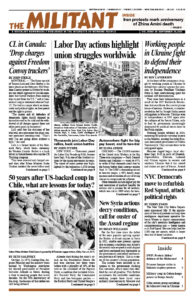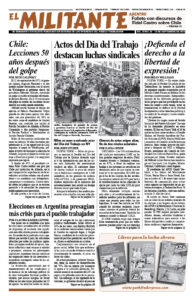Just 10 days before the anniversary of the Sept. 16, 2022, death of the young Kurdish woman, Zhina Amini, at the hands of the hated “morality” police, the regime arrested her uncle, Safa Aeli, in her hometown of Saqez. Amini died when visiting Tehran.
The regime’s intelligence police also called in Zhina’s father, Amjad Amini, Sept. 11 to demand he cancel a planned memorial. He and his wife, Mozhgan Eftekhari, announced Sept. 8 they will hold a “traditional and religious ceremony” to honor their daughter. They called on those who join them to “refrain from any violent actions.” Thousands turned out last year in Saqez when she was buried in the first mass protest against her death.
The regime’s thugs killed some 500 people over the next four months of protests across the country.
Hoping to prevent a new wave of protests, the bourgeois clerical regime pushed back the start of the school year by one week so it didn’t coincide with the anniversary, closed down some student groups, and fired a number of teachers who had backed the protests.
Through the protests working people in Iran have gained more self-confidence. Retirees have been holding weekly nationwide protests. Every week there are new labor actions and strikes by workers demanding unpaid wages, safety on the job, and wage increases to keep up with inflation.
On Sept. 12 the regime released Ismail Abdi, a leader of the Coordinating Council of Iranian Teachers’ Trade Unions in Tehran, after two years in prison. But on the same day Mohammad Sadegh Fahimi, a leader of the union in Yazd, was arrested after participating in a protest by retirees there.
In Sistan-Baluchistan province, Sunni cleric Maulana Abdul-Hamid continues to speak out demanding equal rights for all regardless of their religious beliefs or nationality, for women’s rights, and for freedom for all political prisoners. Baluchis, who are mostly Sunni Muslim, are an oppressed nationality.
In his sermon before thousands marched in the city of Zahedan Aug. 26, Abdul-Hamid noted that officials complain the birthrate is declining. But they do nothing to solve the economic problems that prevent young people from starting families. Trade unions, “retirees, teachers and workers are shouting that their tables are empty,” he said.
In one of his strongest statements against the Shiite-based regime’s counterrevolutionary military adventures abroad, Abdul-Hamid asked, “When the Iranian nation is in need, why should its money be spent in other countries, especially for wars? War burns and destroys.”
Abdul-Hamid said that it was different in the 1980s when “war was imposed on us,” referring to the invasion of Iran by the Iraqi regime of Saddam Hussein with Washington’s backing. Then people fought “alongside the government.” But that’s not true today, he said, alluding to Tehran’s increasingly unpopular interventions in Iraq, Lebanon, Syria and Yemen.
In a statement calling for renewed protests, the Free Union of Iranian Workers said demonstrations after the death of Amini had “irreversibly weakened the government’s position” and “opened a new chapter in the … struggles of the Iranian people.”
Protests are being organized worldwide Sept.16.

